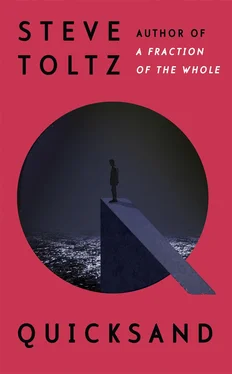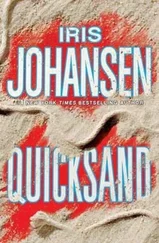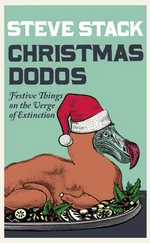‘Just don’t lend him any money,’ I said.
‘Too late for that, I’m afraid.’ It turned out the doctor had invested heavily in High Steaks, Aldo’s defunct restaurant. ‘There is another level to our friendship, of course,’ Doc Castle said darkly. ‘At first he’d ask for advice or assistance, and then if I wouldn’t mind scribbling a little prescription …’
Indeed, that confirmed my suspicions about their relationship; it was a mirror of my own. Just as often as Aldo needed my legal assistance, he called the doctor for medical assistance; when he required bailing out he called me, when he needed patching up he called Doc Castle. What I confirmed that day: I wasn’t the only one on his speed dial, and Aldo’s obsession with his body rivalled his fear of the law. He called Doc Castle for back spasms and sudden immobility, when he’d cut himself with a Stanley knife, for emergency tetanus shots, for burns, when he’d splashed boiling water on his hand or picked up metal pots by the handles, for concussions, for a deafness-inducing buildup of wax in the ear, when he was beaten up by disgruntled investors, to remove a piece of glass from his face (after a pub fight, or slamming the car brakes so that skis went through the front windscreen, or falling drunkenly through a glass shower screen); he called him for a vast array of STD fears — warts, lumps, rashes, burning with urination — for fainting in other doctor’s offices, for lacerations and broken bones and bruises and sprains after falling off ladders and down staircases, for cysts that needed to be removed, and for food poisoning and suspected food poisoning. Aldo called on Doc Castle to prove or disprove his self-diagnoses, and to get emergency appointments with dermatologists, gastroenterologists, radiologists, podiatrists, and to book him in or bump him up on waiting lists for CT scans, MRIs, and the like. ‘Ever since he was a child,’ Doc Castle said, ‘he’s been afraid of internal bleeding.’
‘I know!’
‘He can’t recall the exact TV show he saw it on, but from his childhood onwards, whenever he’s fallen, he’s been convinced he has internal bleeding. That’s the first thing he asks. “Doc, do I have internal bleeding? Do I? Am I bleeding internally?” Or else it’s stitches. He always fears he needs stitches. “Do I need stitches? Does it need stitches?”’ Doc Castle seemed particularly amused that we were both almost constantly on call, bailing out, rescuing, bandaging, advising, stitching, extricating, inoculating, disentangling. The tone of the conversation was jovial — we laughed about the absurdity of being conscripted as unwitting members of this fool’s entourage — but still, my mood began to darken. This idea that there was something special about Aldo carried within it the implication that there was nothing special about us.
To break out of the conversation, I said I needed to make a quick call, and dialled my own number and heard my own voice asking me to leave a message. I whispered, ‘You’re no good,’ and when I hung up and turned back Doc Castle was still laughing about Aldo. I laughed too, but I didn’t feel it. I genuinely loved and pitied my old friend but there was no reason at all why his suffering should eclipse my own, I thought somewhat bitterly, or, quite frankly, that he was a special case in any way.
V
Not two weeks later, around five p.m., my mobile rang. It was one of those days: every driver I random-breath-tested exhibited suspicious behaviour, smiling ferociously or flicking cigarette ash into their laps or making lewd eye contact as they wrapped their cracked lips on the tube and blew, or twitching with restrained violence or staring fixedly ahead or talking gibberish and acting disoriented, surprised to even find themselves driving, as if they were certain they’d left the house on foot.
‘Constable Wilder?’
‘Speaking.’
‘This is Detective Garnick, drug squad. We met at the trial of Norman Lester. I don’t know if you remember.’
‘Of course. How’s your eye?’
‘I look like a fucking Chinaman.’
‘Can I do something for you, Detective?’
‘This is just a courtesy call to let you know I’ve arrested a vet for selling Nembutal at the Montefiore, the Jewish retirement home down Gladesville way.’
‘Well done, you.’
‘It’s a euthanasia drug. Also used to kill horses.’
‘And that’s relevant to me because …?’
‘Aldo Benjamin’s your mate, isn’t he?’
My heart tightened, a palpable dread. What now?
‘We got a list of clients. It seems your boy bought himself two bottles last week.’
Nembutal?
Was Aldo finally going to do it? Ever obsessed with taking his own life, something that could be traced back to his father’s suicide, had he succumbed to the cumulative effects of his long string of professional failures and the permanent loss of Stella? Was this his ultimate dramatic suspension of judgement? Had he decided to listen to the voices in his head, always with the bad advice?
I thanked the detective and hung up. The cars came in an endless stream, the whoosh and screech of traffic in my ears grew louder, and everyone was over the limit — everyone! — and for hours I booked citizen after citizen after citizen, feeling like the last sober man in a crazed nation that ran on booze. In every remorseful driver I saw Aldo’s suicide, the agony of him second-guessing himself too late, and I was afraid I wouldn’t catch him in time, that I’d walk in to see him flapping like a fish on the deck of a boat. These thoughts made me whimper, tear up, knowing Aldo’s abject terror of physical pain. Yet for some reason I can’t account for, I waited until nine p.m., after my shift, to drive over to Phoenix Court. There was a proliferation of abandoned mattresses on the rain-slicked footpath and every parked car seemed to have its own gang of youths perched on its hood.
Even from the elevator, thumping music could be heard that, as it turned out, was coming from Aldo’s apartment. A party was in progress and I felt the vague sting of the uninvited as I made my way inside to see guests drinking, upper-torso dancing, and loud-talking over the music. Thin traces of cocaine were on the glass coffee table, next to bowls of guacamole brown at the edges. The heavy smell of hydroponic pot. There was something perfectly ordinary and yet unaccountably strange about this party, something I couldn’t put my finger on. Aldo was standing by the flat-screen television with glitter on his face, chatting to a pale, scarfed woman with a theatrical voice that carried across the smoky room. ‘And I wasn’t thinking,’ I heard her say, ‘so I accidentally signed my porn name.’ He hadn’t seen me, so I started surreptitiously checking in cupboards for the Nembutal while reassuring guests either visibly spooked at the sight of my uniform or overly excited, mistaking me for a male stripper. As I mingled, it dawned on me, the source of the weirdness: about every third guest I encountered was sick in some way. I spoke to a double amputee, a woman with an incurable liver disease, a recent testicular cancer survivor, gaseous men and women who smelled like the slick coating on vitamins, people who had wasted legs or moony faces or who seemed to have been born into their dotage. Something implausible was going on. People who needed emergency mollycoddling skittered around the party discussing various treatments, the efficacy of this drug over that, superbacteria horror stories. They were all prototypes of a human being in God’s workshop — strictly first drafts.
I marched over to Aldo, interrupting him mid-conversation.
‘Hey, I know this is going to sound fantastically insensitive,’ I said, ‘but seriously, Aldo, what kind of bullshit friends are these? They’re all sick. How can they all be sick? I mean, two is coincidence. Three’s a pattern, but still within the realm of probability. But four? Five? Ten terminally ill pals? What gives?’
Читать дальше











